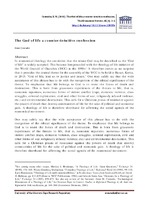The God of life a counter-intuitive confession
Abstract
In ecumenical theology the conviction that the triune God may be described as the
“God of life” is widely accepted. This became foregrounded with the theology of life
initiative of the World Council of Churches (WCC) in the 1990s.1 It therefore comes as no surprise that it provides the central theme for the assembly of the WCC to be held in Busan, Korea, in 2013: “God of life, lead us to justice and peace.”
One may safely say that the wide acceptance of this phrase has to do with the recognition of the ethical significance of the theme. To emphasize that life belongs to God is to resist the forces of death and destruction. This is born from grassroots
experiences of the threats to life, that is, economic injustices, numerous forms of
violent conflict (rape, domestic violence, class struggles, colonial exploitation, civil
and other forms of war, religiously infused violence, etc.) and environmental destruction.
This calls for a Christian praxis of resistance against the powers of death that
destroy communities of life for the sake of political and economic gain. A theology
of life is therefore shorthand for affirming the social agenda of the ecumenical
movement.

